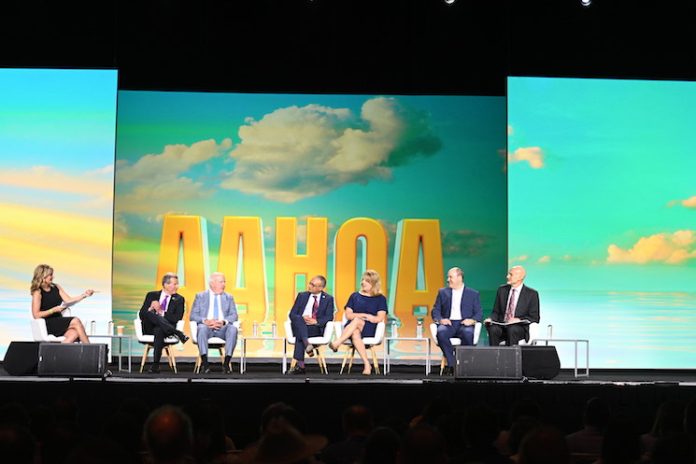
As a handful of major brand CEOs assembled during AAHOACON ’24 to weigh in on key industry issues, a major focal point was increased operating costs and their impact on margins.
Speaking during the opening general session, the executives identified a number of ongoing challenges and potential industry disruptors, including increased government regulation, as well as the continued emergence of artificial intelligence.
Best Western President/CEO Larry Cuculic framed the discussion on industry challenges by asking the more than 6,000 attendees tongue-in-cheek for a show of hands from those who are seeing insurance costs decrease. “It’s a huge challenge, agreed?”
Julie Arrowsmith, President/CEO of G6 Hospitality, reinforced the point.
“It’s a challenge for everyone. We’ve all felt it both on the owner side and the brand side. As an opportunity, it’s really important that we listen to our owners. We’ve spent a lot of time talking to our owners, visiting their hotels and hearing specifics around insurance. We’ve said, ‘okay, let’s [look to] partner with an insurance company that can really help with the types of needs that our owners have.’”
For his part, Rajiv Trivedi—member of board of directors, Red Roof—insisted that insurance costs are only part of the issue for operators.
“I think what it comes down to is margin challenge. The margins for the owners of hotels have continued to disseminate over the last 15 years and insurance is a part of it, but it also includes labor, supply costs, construction costs, and financing. At the end of the day as brand leaders our responsibility is to work hard and find ways that we can improve your margins. That’s the difference that our industry needs to make and focus on over the next 10 years in my mind,” he said.
Greg Juceam, President/CEO, Extended Stay America, meanwhile, pointed to lending as the biggest issue facing the industry today.
“It’s just very difficult right now with all the terms, including the rates and the loan-to-value ratios. Because of that the deal volume is down, the capital being spent on those hotels that are very desperately in need of repair is down and that’s the most immediate challenge we have,” he said.
Juceam added, “there is some evidence, of course, that the big banks are going to begin to lend again and the spreads are going to tighten, but the regional banks seem to be trailing behind.”
Jon Murray, President/CEO, Sonesta International Hotels, pointed to the threat of government regulation with regards to issues such as minimum wage laws and franchise rules, as a key issue that bears watching.
“I think we need organizations like AAHOA and AHLA, as well as our own teams, to monitor those things every day really,” he said.
Geoff Ballotti, President/CEO, Wyndham Hotels & Resorts, agreed with Murray and also touted the voice of associations like AAHOA on Capitol Hill.
“I think John just hit the nail on the head in terms of this association’s future and government not being as involved in our business as they are today or that they want to be. All of us should be pushing back. The Department of Labor should be helping lower your labor costs, not watching them go up,” he said.
When it comes to industry disruptors, Cuculic detailed a groundbreaking artificial intelligence solution that he suggested could be a game changer in the newly introduced Search-Generative Experience from Google. He emphasized the significance of its bend toward proprietary information searched strictly on Google.
“You can pay for whatever results you want, but they will value the guest on Google. This is going to have a direct impact on your bottom line. So to me Google’s new Search-Generative Experience is going to be a huge disruptor,” he said.
Arrowsmith pointed out, “With any new technology that rolls out there’s refinement that has to happen.”
While acknowledging that challenges exist, Trivedi highlighted the potential upside of these types of solutions.
“AI is becoming more and more prevalent. The opportunity for you is that you will know your guest up close and you can do personal targeted marketing. There’s an opportunity for you to leverage and provide personalized service or the feeling of personalized service for each guest coming to your hotel because you would know their tendencies. AI is scary, but AI is a great opportunity in my view,” he said.











